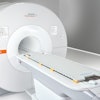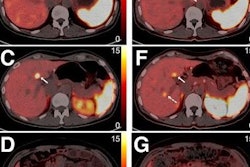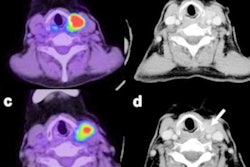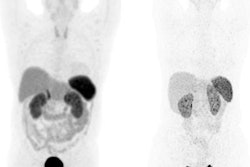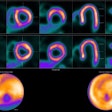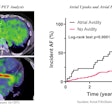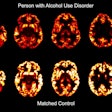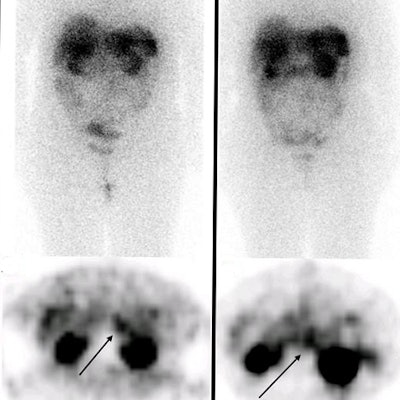
PET imaging with gallium-68 (Ga-68) DOTATATE appears effective for diagnosing recurrent thyroid cancer in patients following surgery, according to a study published September 17 in Annals of Endocrinology.
A group in Iran studied results in patients with proven medullary thyroid carcinoma (MTC) and suspected recurrence following thyroidectomy. The team found Ga-68 DOTATATE PET/CT scans detected positive lesions in 85% of patients.
"The primary issues regarding this malignancy are locating and detecting recurrent disease, particularly given the high recurrence rate of up to 50%," wrote corresponding author Dr. Majid Assadi, director of Bushehr University's Persian Gulf Nuclear Medicine Research Center.
MTC is a rare neuroendocrine tumor (NET) with poor outcomes. Total thyroidectomy and neck dissection are the recommended treatments, yet about 50% of patients who undergo aggressive surgery have persistent metastatic disease.
In 2016, the U.S. Food and Drug Administration approved Ga-68 DOTATATE for use with PET imaging to help locate tumors in adult and pediatric patients with NETS. The radiotracer binds to somatostatin receptors (SSTRs) on cancer cells, which are overexpressed in these tumors.
Previously, the group has reported that SSTR tracers are effective for detecting high-grade glioma and neuroblastoma, yet data are sparse on whether they may be effective in patients with MTC, the authors wrote.
In this study, the researchers obtained a kit for injecting Ga-68 DOTATATE from isotope manufacturer Pars Isotope in Tehran. They enrolled 20 patients between the ages of 27 and 71 with histologically proven MTC and suspected recurrence following total thyroidectomy.
About 60 minutes after intravenous injection of the tracer (148-185 MBq), patients underwent PET/CT scans (Biograph 6 Truepoint, Siemens Healthineers). PET/CT images were visually reviewed by two nuclear medicine specialists.
![A 56-year-old woman with raised calcitonin levels following thyroidectomy, and therefore suspected of recurrent MTC, underwent Ga-68 DOTATATE PET/CT. Results show radiotracer uptake in the pancreatic tail (maximum standardized uptake value [SUVmax], 10.5) and left kidney (SUVmax, 11.8) (A). The patient underwent three cycles of peptide receptor radionuclide therapy with Lu-177 DOTATATE (10.5 GBq). Post-treatment scintigraphy after the first (B) and second (C) cycles showed an accumulation of radiotracer in the lesions, which was significantly reduced in the third cycle (D), revealing partial response. Image courtesy of Annals of Endocrinology.](https://img.auntminnie.com/files/base/smg/all/image/2022/09/am.2022_09_20_22_57_8787_2022_09_21_DOTATATE_PET.png?auto=format%2Ccompress&fit=max&q=70&w=400) A 56-year-old woman with raised calcitonin levels following thyroidectomy, and therefore suspected of recurrent MTC, underwent Ga-68 DOTATATE PET/CT. Results show radiotracer uptake in the pancreatic tail (maximum standardized uptake value [SUVmax], 10.5) and left kidney (SUVmax, 11.8) (A). The patient underwent three cycles of peptide receptor radionuclide therapy with Lu-177 DOTATATE (10.5 GBq). Post-treatment scintigraphy after the first (B) and second (C) cycles showed an accumulation of radiotracer in the lesions, which was significantly reduced in the third cycle (D), revealing partial response. Image courtesy of Annals of Endocrinology.
A 56-year-old woman with raised calcitonin levels following thyroidectomy, and therefore suspected of recurrent MTC, underwent Ga-68 DOTATATE PET/CT. Results show radiotracer uptake in the pancreatic tail (maximum standardized uptake value [SUVmax], 10.5) and left kidney (SUVmax, 11.8) (A). The patient underwent three cycles of peptide receptor radionuclide therapy with Lu-177 DOTATATE (10.5 GBq). Post-treatment scintigraphy after the first (B) and second (C) cycles showed an accumulation of radiotracer in the lesions, which was significantly reduced in the third cycle (D), revealing partial response. Image courtesy of Annals of Endocrinology.According to the findings, 17 patients (85%) showed positive lesions on Ga-68 DOTATATE PET: four were local, six distant, and seven were both local and distant metastases. The median number of detected lesions in the 17 positive patients was three (range, 1-16).
"[Ga-68 DOTATATE] PET showed a relatively high MTC detection rate in patients with recurrent MTC following thyroidectomy," the authors wrote.
Ultimately, detecting the site or sites of recurrence in MTC is very important, and the combined use of several other imaging modalities (CT, MRI, ultrasound, and bone scintigraphy) enables lesion detection and location in only about 40% of cases, the authors noted.
Limitation in this study included the small number of patients and the inability to precisely compare Ga-68 DOTATATE PET/CT with other imaging modalities such as F-18 FDG PET/CT and conventional imaging to detect recurrent MTC.
Nonetheless, in the present study, Ga-68 DOTATATE PET/CT showed a relatively high detection rate, and its diagnostic use warrants further investigation, the authors concluded.




